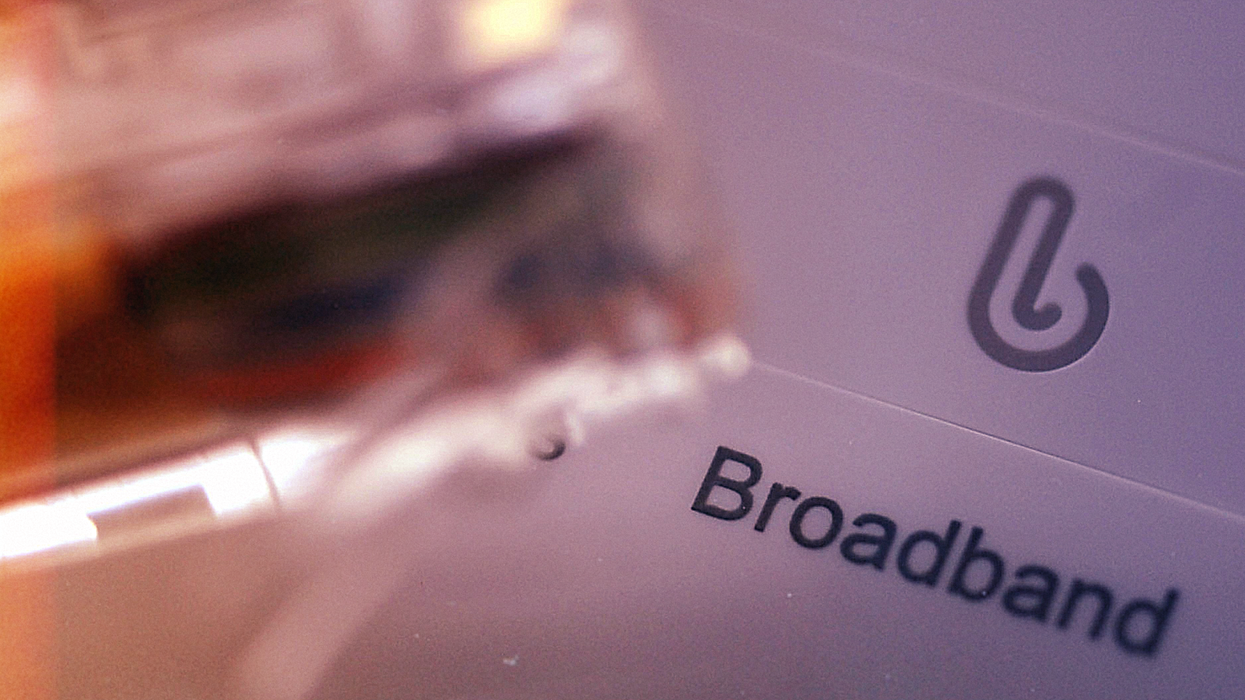Broadband price rises linked to inflation OUTLAWED under new Ofcom rules for BT, TalkTalk, EE, more

Ofcom will move ahead with its proposal to outlaw all mid-contract price rises linked to inflation. The ban will impact broadband, pay monthly phone contracts, and pay-TV customers in the UK
|PRESS ASSOCIATION | GBN

All products and promotions are independently selected by our experts. To help us provide free impartial advice, we will earn an affiliate commission if you buy something. Click here to learn more
Industry regulator blocks annual price hikes linked to unknown future inflation figures
Don't Miss
Most Read
Broadband providers will be banned from increasing prices during your contract under tough new rules from Ofcom. The ban is designed to halt the common practice of tying annual price rises to runaway inflation figures.
The industry watchdog floated the proposal last year, but has now confirmed that it'll force UK companies to be upfront and tell customer about any price rises included in their contract in pounds and pence.
This is a dramatic change from inflation-based rises, which you simply “cannot predict” ahead of time.
As well as a shake-up for broadband providers, Ofcom's strict new rules will also impact mobile networks and pay-TV companies, like Sky TV and Virgin Media.
“We have decided to ban this practice,” the regulator confirmed in an announcement earlier today.
- View Deal | Get 145Mbps broadband speeds with Sky for £29
- View Deal | Get Sky TV + Netflix + broadband for £14 with Sky Glass TV
- View Deal | Get 500Mbps broadband speeds from Vodafone for £33
- View Deal | Get 300Mbps broadband speeds from Plusnet for £29.99
Starting from January 2025, all mid-contract price rises from broadband, mobile, and pay-TV providers will need to be spelt out in pounds and pence when you sign up for the contract.
Until recently, the majority of UK broadband suppliers, including the likes of BT, EE, TalkTalk, Plusnet, and Virgin Media, relied on measures of inflation to determine annual price rises for existing customers.
The long-held practice came under fire following months and months of spiralling inflation figures, which have led to BT, EE, TalkTalk, and Vodafone customers seeing an increase of over 14% last year. If you paid £30 per month for your internet connection, that inflation-fuelled rise equated to an extra £51 every year.
Virgin Media O2 was close behind with a 13.8% increase for all customers in early 2023 and Sky, which doesn't link its price rise to the CPI or RPI measures of inflation, increased bills for broadband and television customers by 8.1% on average. Sky is one of the only nationwide providers that allows its customers to leave mid-contract without incurring any fees if they're unhappy with the annual increase.
Despite inflation falling throughout the last seven months, things weren't much better this time around. When the annual price increases rolled around in April, BT, Plusnet, EE, TalkTalk and Virgin Media customers saw bills increase by a minimum of 7% — totalling an extra £28 per year for the average bill-payer. Sky customers were hit by an average increase of 6.7% across broadband and TV subscriptions in April 2024.
With the latest shake-up from Ofcom, inflation will no longer have any bearing on your broadband bills.
Unfortunately, that doesn't mean you can necessarily expect to see smaller price rises on your broadband. In fact, with inflation rates tipped to fall dramatically in the coming months, subscribers could experience higher increases than they would've seen under the CPI-linked system by the time March 31, 2025 rolls around.

Ofcom issued an example to demonstrate how broadband companies should display mid-contract price rises following the rule change
|OFCOM PRESS OFFICE
Ofcom analysis conducted in the consultation period for the price rise ban revealed that four in 10 broadband customers in the UK were on inflation-linked contracts last year. But despite the prevalence of these broadband plans, Ofcom found that most customers had very little knowledge of the exact details.
Just 16% of broadband customers surveyed by Ofcom knew their monthly bills could rise, and that any increase would be linked to inflation with an additional percentage added on top. And even when people did actively consider future inflation-linked price rises when choosing a contract, they did not understand them fully and found it tough to estimate the exact monetary impact, Ofcom research found.
Under new rules enforced by Ofcom, mid-contract rises linked to nebulous figures, like Consumer Price Inflation (CPI) or RPI (Retail Price Index, another measurement of inflation), have been effectively outlawed. Broadband companies will still be able to increase prices mid-contract, but the new rules will require them to tell customers precisely how much extra they'll need to spend.
Broadband firms will need to spell out the exact amount customers need to pay each year as prices rise throughout the minimum contract term, the industry regulator has ruled. Most broadband suppliers sign-up customers to a contract term between 12- to 24-months.
The change will block price rises linked to unknown future inflation values or percentages.
In an example provided by Ofcom to demonstrate the new rules, it said a previous advert stating that a broadband plan that costs £30 per month but would rise by “CPI plus 3.9%” would have to change.
Under the new rules, the advert would need to read: “Monthly subscription price: £30.00 until March 31, 2024. Increasing to £31.50 on April 1, 2024 and £33.00 on April 1, 2025."
Ofcom telecoms policy director Cristina Luna-Esteban said: “With household budgets squeezed, people need to have certainty about their monthly outgoings. But that’s impossible if you’re tied into a contract where the price could change based on something as hard to predict as future inflation.
“We’re stepping in on behalf of phone, broadband and pay TV customers to stamp out this practice, so people can be certain of the price they will pay, compare deals more easily and take advantage of the competitive market we have in the UK.”
In anticipation of the change, several of the biggest broadband providers in the UK announced a shake-up of their annual price rises. BT and EE outlined new fees for its broadband, pay-TV and phone contracts earlier this summer. Other providers who haven't changed the small-print on their websites will have until January 2025 to conform to the new rules from Ofcom.
If you’re in the minimum contract term of your broadband package, unfortunately, there’s no way to swerve these price increases – you'll just have to pay the higher bills and try to renegotiate a better deal at the end of your contract.
After that, you’ll be able to renegotiate a new deal with the same provider or switch to another brand.

Ofcom's new red-tape doesn't stop broadband suppliers from increasing prices for customers mid-contract. However, it means firms are no longer able to link these annual rises to the rate of inflation
| GETTY IMAGES- View Deal | Get 145Mbps broadband speeds with Sky for £29
- View Deal | Get Sky TV + Netflix + broadband for £14 with Sky Glass TV
- View Deal | Get 500Mbps broadband speeds from Vodafone for £33
- View Deal | Get 300Mbps broadband speeds from Plusnet for £29.99
Speaking about the change, Rocio Concha, Which? Director of Policy and Advocacy, said: "Ofcom confirming a ban on unfair and unpredictable mid-contract price hikes is a huge win for consumers.
"Which? has led the campaign to protect millions of households from being blindsided by telecoms price rises and give them certainty about the cost of these essential services. With Ofcom calling time on these unfair price hikes, providers must stop this practice immediately. Ofcom now needs to make sure that future mid-contract price rises are set competitively.
"It’s disappointing that ‘prices may vary’ terms have not been banned. The regulator must be prepared to intervene if these ad hoc increases are used as a back door for providers to impose unpredictable price increases on customers."










